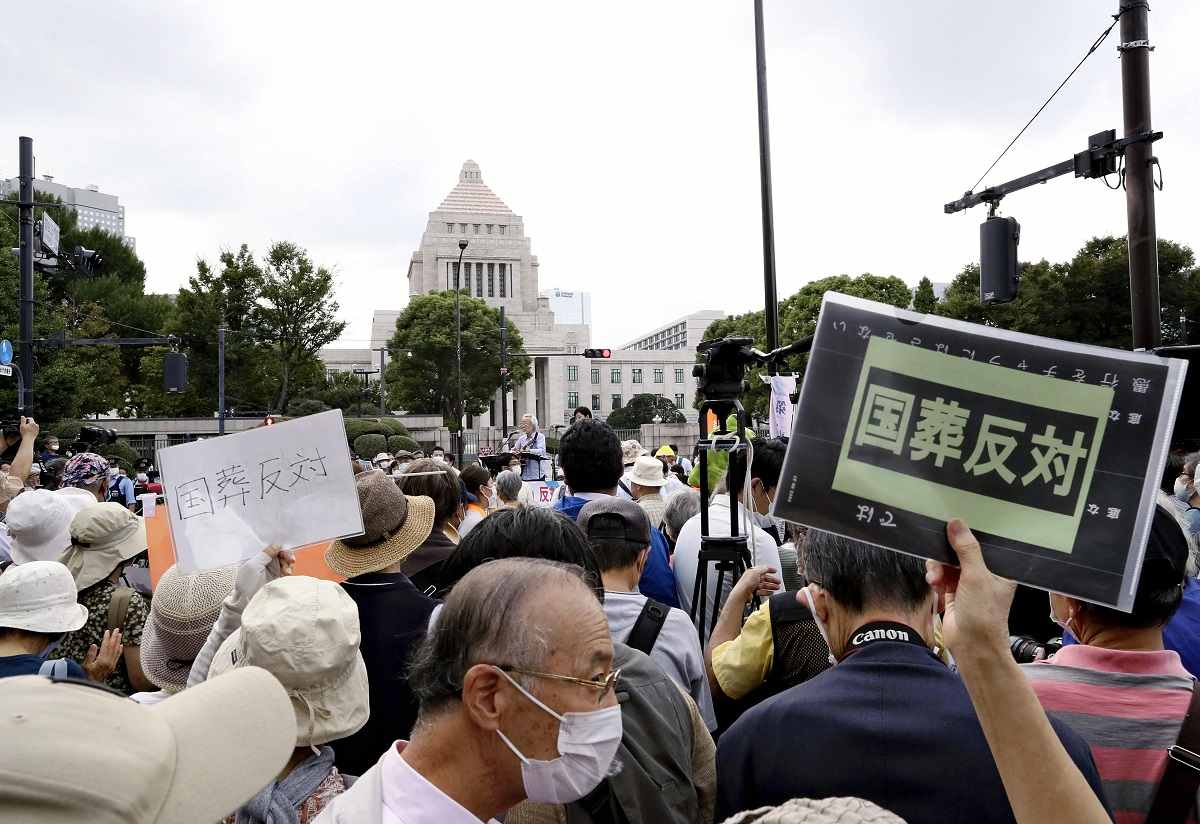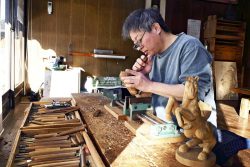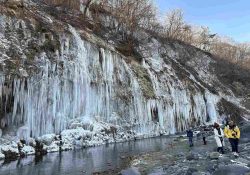- Social Series
- AFTERMATH OF A MURDER
1 Year Since Abe Shooting / Japan Weighs How Best to Protect Dignitaries Against ‘Lone-wolf’ Attacks
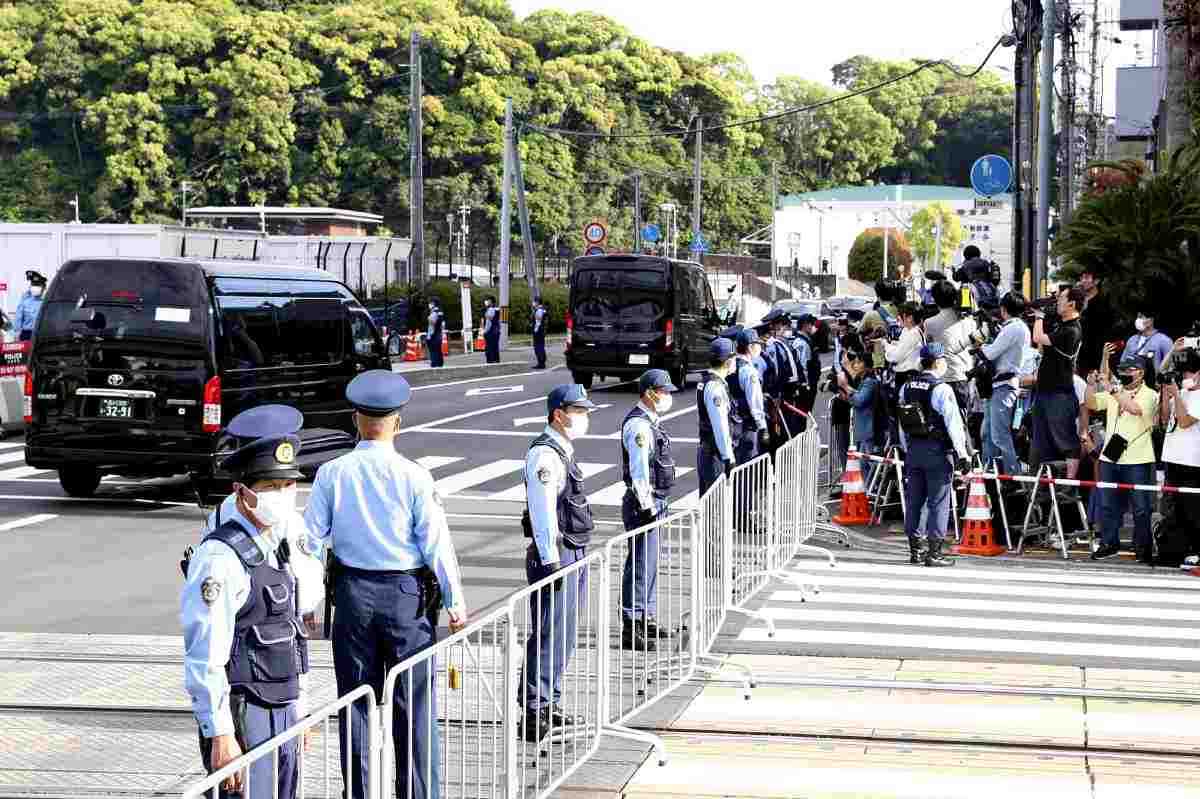
Police guard Ukrainian President Volodymyr Zelenskyy’s motorcade as it travels toward the Grand Prince Hotel Hiroshima in Hiroshima on May 20.
The Yomiuri Shimbun
6:00 JST, July 11, 2023
One year has passed since former Prime Minister Shinzo Abe was shot to death while giving a campaign speech for a House of Councillors election candidate in Nara on July 8 last year. What impact has the killing had on Japanese society and politics? This is the second installment of a series on the lasting ramifications of the incident.
※※※
On the afternoon of May 20, the commander of Japan’s police security force instructed staff to raise their vigilance level to that of guarding a VIP akin to the U.S. president. The order came just two hours before Ukrainian President Volodymyr Zelenskyy made a surprise visit to Japan.
Though Zelenskyy’s trip to Japan — coinciding with the May 19-21 G7 Hiroshima Summit — had been reported the day before, security arrangements were kept under wraps until the last minute to ensure optimal security.
Precautionary arrangements were already at an unprecedented high for the summit, which was attended by the leaders of numerous industrialized countries, including the United States. An “alert zone” with a wider-than-usual radius of about 1.5 kilometers was established around the visiting dignitaries.
Security levels peaked with Zelenskyy’s attendance, as it was deemed that the mere throwing of an egg in his general direction “could develop into a diplomatic issue,” according to a senior National Police Agency official.
The expressway used by the Ukrainian entourage to travel the 50 kilometers from Hiroshima Airport to Zelenskyy’s accommodation was closed off in both directions. Contrastingly, when Prime Minister Fumio Kishida traveled the same route, the road was only shut down in one direction. Zelenskyy’s itinerary and travel plans were strictly confidential, and “every conceivable measure was taken,” to ensure his safety, a senior NPA official said.
The NPA’s rigorous security measures were partly spurred by a desire to restore public trust in the wake of Abe’s fatal shooting.
Abe’s slaying was a major news event around the globe. Immediately following the incident, then NPA Commissioner General Itaru Nakamura asked a high-ranking NPA Security Bureau official to show him the protection plan for the event. The official reportedly replied, “I’m waiting for a copy to be sent from the Nara prefectural police.”
At that time, there was no system in place wherein the NPA could check or receive information about protection plans prepared in advance by prefectural police forces.
The site of the shooting was a wide-open, easily targetable location that lacked traffic controls and the presence of uniformed police officers. The NPA’s investigation highlighted a string of security failings.
Based on its findings, the NPA revised its protection guidelines for the first time in 28 years and introduced a system to facilitate the advance review of prefectural police forces’ security plans to protect VIPs.
Nevertheless, in April, an explosive device was thrown toward Prime Minister Fumio Kishida at a campaign speech venue in Wakayama City. In preliminary discussions, the Wakayama prefectural police had requested the Liberal Democratic Party’s prefectural chapter to employ metal detectors and establish a reception desk to check the identity of attendees, but both requests were rejected.
Despite the NPA’s overhaul of its security measures, a VIP’s life was once again imperiled. As such, it has become clear that strengthened police security cannot guarantee dignitaries’ safety without cooperation from the VIPs themselves.
In June, the NPA announced a new policy that requires political parties to hold events indoors and employ bag-checks, among other initiatives. While the parties have shown a certain level of understanding regarding such measures, there is still a strong belief that “stump speeches are the best way to reach out to a wide range of voters,” as one LDP House of Representatives lawmaker put it.
The introduction of enhanced security measures engenders narrower political freedoms. While improving security is not an easy task, detecting lone-wolf attackers is viewed as a key element in preventing attacks on VIPs.
Police boost intel-gathering
Following the arrest of Tetsuya Yamagami over the fatal shooting of former Prime Minister Shinzo Abe on July 8 last year, an official of the National Police Agency’s Public Security Division examined relevant documents and proclaimed: “Is his name on the list? What kind of person is he?”
Yamagami has been indicted for murder and other charges.
The documents included a list of people who have previously attempted to carry out violent attacks in the past, including a former staffing agency employee who made an explosive device by mixing chemicals, and a former Self-Defense Force officer who tried to detonate a bomb at the Imperial Palace.
However, the list did not include Yamagami’s name, and he had not figured on the Public Security Division’s radar.
The police refer to unaffiliated individuals who act alone to carry out terrorist acts — often after becoming radicalized — as “lone offenders.” Example of such people include a then 40-year-old unemployed man who landed a drone on the roof of the Prime Minister’s Office in 2015.
Yamagami, 42, was a lone offender, too. With only one online follower, he used Twitter to criticize the Family Federation for World Peace and Unification — formerly known as the Unification Church — in which his mother was involved. Yamagami lived alone in a condominium and constructed a gun using iron pipes and other materials. Residents in the condominium reported hearing sawing sounds, but no one contacted the police.
Following Abe’s murder, the police organized lone offenders into three categories: those who kill or injure others based on specific principles; those who attack VIPs or important facilities; and those who are interested in the production and procurement of explosive devices and guns. Many social media posts point to possible criminality and the police have strengthened their online information-gathering activities.
In October, police detected a possible lone offender. A then 29-year-old company employee in Sapporo crafted a potentially fatal iron-pipe gun and tried to concoct powerful shotgun shells. The Hokkaido prefectural police arrested the man on suspicion of violating the Explosives Control Law.
The investigation began when the Metropolitan Police Department became aware of a suspicious-looking air gun on an auction website. The police searched the man’s home and found the device. After being arrested, the man reportedly told investigators: “I made a higher-performance gun than Yamagami’s. I was interested in guns and making more powerful weapons.”
However, such cases are rare. Detecting lone offenders before they commit a crime is not easy. Police were unaware of Ryuji Kimura, 24, who threw an explosive device toward Prime Minister Fumio Kishida at a campaign event in Wakayama City in April.
From August, the NPA will launch an initiative within some police departments in which information regarding suspicious individuals obtained by koban police box officers or traffic control personnel is sent to the Public Security Division. The initiative aims to gather information from a wider range of sources than at present. However, there are questions regarding the degree to which police should check on citizens’ activities. Some people have expressed concerns — including police officers — that if the police go too far, they could violate public freedoms.
Shuichiro Hoshi, a professor specializing in criminal law at Tokyo Metropolitan University who is also familiar with public security and privacy protection issues, said: “As with the guarding of VIPs, the police need to adopt a balanced approach with regard to lone offenders. The police should carefully examine necessary safety levels for citizens and promote relevant measures through careful discussions.”
Related Articles
Most Read
Popular articles in the past 24 hours
-
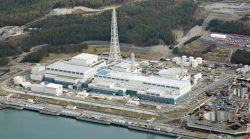
TEPCO to Reactivate Nuclear Reactor at Kashiwazaki-Kariwa Power P...
-
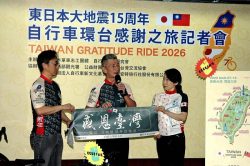
Tae Hitoto Leads Japanese Cyclists Planning Trip Around Taiwan to...
-

Travel Across PokéPark KANTO, Searching Far and Wide for Your Fav...
-

Israeli Ambassador to Japan Speaks about Japan’s Role in the Reco...
-
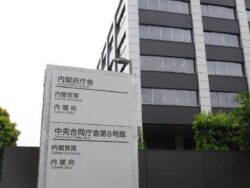
Japan’s Govt Sets Goal for World’s No. 3 in Number of Highly Cite...
-
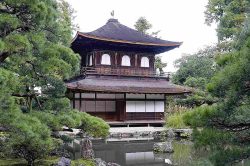
Japan's Ginkakuji Temple to Increase Admission Fees for 1st Time ...
-
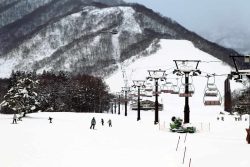
Australian Woman Died of Asphyxiation in Nagano Ski Lift Accident...
-
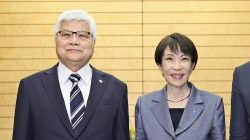
TMSC to Produce 3-Nanometer Semiconductors in Japan's Kumamoto Pr...
Popular articles in the past week
-

Man Infected with Measles May Have Come in Contact with Many Peop...
-

Australian Woman Dies After Mishap on Ski Lift in Nagano Prefectu...
-

Foreign Snowboarder in Serious Condition After Hanging in Midair ...
-

Chinese Embassy in Japan Reiterates Call for Chinese People to Re...
-

Narita Airport, Startup in Japan Demonstrate Machine to Compress ...
-

Toyota Motor Group Firm to Sell Clean Energy Greenhouses for Stra...
-

Beer Yeast Helps Save Labor, Water Use in Growing Rice; Govt Hope...
-

Japan Tourism Agency Calls for Strengthening Measures Against Ove...
Popular articles in the past month
-

Univ. in Japan, Tokyo-Based Startup to Develop Satellite for Disa...
-

JAL, ANA Cancel Flights During 3-day Holiday Weekend due to Blizz...
-

Japan Institute to Use Domestic Commercial Optical Lattice Clock ...
-

China Eyes Rare Earth Foothold in Malaysia to Maintain Dominance,...
-

China Confirmed to Be Operating Drilling Vessel Near Japan-China ...
-

Man Infected with Measles May Have Come in Contact with Many Peop...
-

Japan, Qatar Ministers Agree on Need for Stable Energy Supplies; ...
-

Australian Woman Dies After Mishap on Ski Lift in Nagano Prefectu...
Top Articles in Society
-

JAL, ANA Cancel Flights During 3-day Holiday Weekend due to Blizzard
-

Man Infected with Measles May Have Come in Contact with Many People in Tokyo, Went to Store, Restaurant Around When Symptoms Emerged
-

Australian Woman Dies After Mishap on Ski Lift in Nagano Prefecture
-

Foreign Snowboarder in Serious Condition After Hanging in Midair from Chairlift in Nagano Prefecture
-

Record-Breaking Snow Cripples Public Transport in Hokkaido; 7,000 People Stay Overnight at New Chitose Airport
JN ACCESS RANKING
-

Univ. in Japan, Tokyo-Based Startup to Develop Satellite for Disaster Prevention Measures, Bears
-

JAL, ANA Cancel Flights During 3-day Holiday Weekend due to Blizzard
-

Japan Institute to Use Domestic Commercial Optical Lattice Clock to Set Japan Standard Time
-

China Eyes Rare Earth Foothold in Malaysia to Maintain Dominance, Counter Japan, U.S.
-

Man Infected with Measles May Have Come in Contact with Many People in Tokyo, Went to Store, Restaurant Around When Symptoms Emerged
